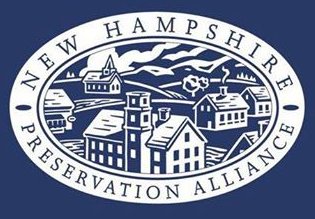Town Meeting Results 2019
Put away your yard signs and cushions for those metal gymnasium seats: town meeting season is now over.
Across New Hampshire, we saw mostly positive votes for preservation initiatives: from the creation of heritage commissions to the seeding of capital reserve funds to the successful transfer of historic properties.
Studies
The following towns approved planning studies for historic buildings: Alexandria (for their 1913 town hall), Gilmanton (for the old town hall in Gilmanton Iron Works), and Meredith, where the 2016 Seven to Save Meredith Public Library will get $400,000 in pre-construction services to address keeping the historic building downtown.
Capital Reserve Funds
Fitzwilliam voters approved $250,000 to help fund restoration of their town hall.
Many towns were prompted to ask voters to appropriate funds to address needs in preparation for (or as a result of) planning studies. These towns include Alexandria, which created an expendable trust for town hall preservation; Effingham, which added $20,000 to its fund for their historic town hall and library; Fitzwilliam, which voted to add $250,000 into its fund to preserve their historic meetinghouse/town hall; and Wilmot, which added $50,000 to its reserve fund for their town hall.
Alton voters approved $14,000 for their town hall; Ashland’s library will increase their fund by $20,000; Grafton approved $25,000 for the library capital reserve fund; Barrington’s Town Buildings Preservation and Rehabilitation Fund Capital Reserve was upped by $50,000; Bennington’s Dodge Memorial Library received $5,000; and the Bethlehem Country Club (a town-owned golf course with 1912 club house) will now have its funding set aside in a revolving fund.
Planning Tools
Kensington becomes the state’s newest Heritage Commission after failing at the polls last year (perseverance pays off!). Hampton also voted to re-establish its Heritage Commission, reversing a 2015 decision to disband it.
Three new towns adopted RSA 79-E, or the downtown revitalization tax incentive. Francestown, Loudon, and Troy can now offer property tax relief for historic properties that undergo extensive rehabilitation within downtown boundaries. An attempt to pass 79-E in Kingston failed. Nearly 40 towns in New Hampshire now offer this program.
Two attempts to change historic district boundaries got different results. In Bedford, a proposal to remove a property from the local historic district failed. In Gilmanton, however, a petitioned article to remove a property from one of the town’s historic districts passed.
Preservation Projects
Lee’s Parish House was spared from demolition thanks to efforts by the Heritage Commission and Historical Society.
Several Seven to Save properties will see investment this year thanks to voters. In Canterbury, 2018 Seven to Save Turning Mill Pond dam received $25,000. The Lee Parish House (2018) was spared from demolition for another year while the historical society and Heritage Commission work to study its potential reuse. In Bartlett, school district voters approved the transfer of the former St. Joseph Catholic Church (2017) to the Bartlett Historical Society, which is currently raising money for rehabilitation.
In Moultonborough, the French-Taylor House (2017) was also spared from demolition thanks to good work by the Heritage Commission. There, voters instead opted to sell the house to a local couple who pledge to rehabilitate it and use it to sell home décor. Londonderry voters approved $20,000 for the Londonderry Grange (a Seven to Save category from 2013). And in Rye, voters once again rejected a proposal to spend $3.5 million to raze the historic town hall (2015) and construct a facsimile. Instead, voters approved a measure to lay future proposals involving demolition of the town hall to bed.
Charlestown’s Silsby Library got its matching LCHIP funds for masonry repairs.
Several LCHIP projects will also move forward thanks to appropriations at town meeting. Charlestown voted $160,500 for masonry repairs to the Silsby Library and North Hampton voted $50,000 for Centennial Hall.
Alstead’s remarkable Shedd-Porter Library will get $105,600 in masonry repairs, a building that received a planning study from the Preservation Alliance in 2009. Back in Bethlehem, voters approved an article that directs the selectmen to pursue a long-term lease for the municipal country club. And in Pembroke, voters approved $34,420 for continued maintenance of the Suncook Clock Tower (which won a Preservation Achievement Award in 2001).
What We’re Still Watching
Not all town efforts were successful, however, and the Alliance is still watching a few votes unfold. In Durham, Oyster River School District voted for $800,000 in pre-construction costs for a new $45 million middle school, which will likely replace the historic one.
Carroll’s Town Hall will soon become obsolete and in need of a new use after voters approved construction of a new complex.
In Hooksett, voters rejected spending $200,000 from the town’s surplus to fund continued rehabilitation at the historic town hall. In Pembroke, voters directed the town to cease owning and maintaining the former fire station at 4 Union Street (also known as the Perry Eaton Building) – a contributing building to the village’s National Register Historic District. And in Carroll, voters approved a $4.455 million bond to build a new town hall/library/public safety complex, rendering the historic town hall without an immediate or obvious use.
What did we miss? Let us know.




